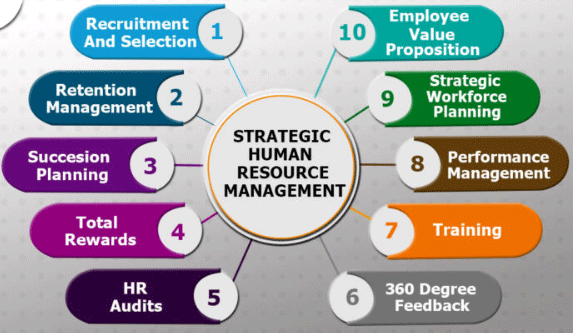
The HR Strategy is a framework designed to achieve the long and short-term organizational goals through the implementation of HR concepts. Its purpose is to optimize the utilization of human resources by capitalizing on their strengths and mitigating weaknesses. This strategy encompasses various components, including cooperative strategy, competitive strategy, and functional level strategy.
In any organization, the attainment of goals is of utmost importance. Strategic human resources are indispensable in this process as they ensure that the objectives and aims are effectively communicated to employees. When employees have a clear understanding of their roles and responsibilities, they are more likely to perform well and contribute to the successful operation of the business. On the contrary, without adequate HR support, organizations may struggle to meet their goals within the designated timeframe. Thus, HR plays a crucial role in achieving organizational objectives.
The human resources department possesses extensive knowledge about the individuals they recruit. Their responsibility extends to selecting suitable candidates for various departments within the company. Strategic human resource professionals provide specific goals to competent employees, aligning their efforts with organizational objectives.
Strategic resources are responsible for predicting the future human resource needs of the organization. Strategic HRM helps to minimize and manage the risk of potential shortages in the workforce, ensuring that the organization remains aligned with its processes.
Different individuals require distinct motivational tools. While some may be motivated by a consistent salary, others find incentives or allowances inspiring. In today’s context, promotions serve as significant motivating factors. Employees seek promotions and social recognition as means of enhancing their motivation and dedication. HR professionals possess the expertise to effectively motivate employees, enabling the organization to reach its goals.
The responsibility of evaluating employee performance lies with HRM. Recognition and rewards are based on an employee’s work and output. Strategic human resources employ appropriate performance evaluation methods, and if necessary, provide training and educational opportunities to enhance employee performance.
Strategic Planning in Human Resource Management involves HR planning to align the organization’s human resource needs with its long-term goals. Organizations hire competent individuals instrumental in achieving these objectives. HR professionals possess the expertise to identify the specific skill sets required for successful hires. Important decisions are made by key individuals within the organization, while strategic HR professionals communicate the outlined objectives to employees. When goals are well-defined and understood, their accomplishment becomes more attainable. Consequently, employees must grasp the operational aspects to execute their responsibilities effectively. HR professionals recruit competitive and skilled individuals to build a capable workforce. If recruiters identify shortcomings in employee performance, they provide necessary training to enhance competitiveness.
Strategic HRM is a collection of plans aimed at facilitating the smooth operation of organizational processes. HR assumes a critical role in this endeavor and is, therefore, an essential component of human resources management. The strategic HR team possesses the knowledge to determine the necessary steps for progress, effectively minimizing organizational risks related to human resource management.
The primary objective of strategic HRM is to understand issues concerning company culture, structure, effectiveness, resource matching, and performance. By addressing these issues strategically, an organization can enhance its capabilities. Additionally, strategic HRM fosters mutual commitment between managers and employees, further improving overall company performance. Emphasizing productivity and profitability allows the organization to capitalize on its human capital and resources, ensuring smooth and efficient business operations.

 Follow
Follow